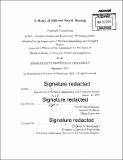A study of efficient secret sharing
Author(s)
Vasudevan, Prashant Nalini
DownloadFull printable version (2.662Mb)
Other Contributors
Massachusetts Institute of Technology. Department of Electrical Engineering and Computer Science.
Advisor
Vinod Vaikuntanathan.
Terms of use
Metadata
Show full item recordAbstract
We show a general connection between various types of statistical zero-knowledge (SZK) proof systems and (unconditionally secure) secret sharing schemes. Viewed through the SZK lens, we obtain several new results on secret-sharing: " Characterizations: We obtain an almost-characterization of access structures for which there are secret-sharing schemes with an efficient sharing algorithm (but not necessarily efficient reconstruction). In particular, we show that for every language L [set membership] SZKL (the class of languages that have statistical zero knowledge proofs with log-space verifiers and simulators), a (monotonized) access structure associated with L has such a secret-sharing scheme. Conversely, we show that such secret-sharing schemes can only exist for languages in SZK. " Constructions: We show new constructions of secret-sharing schemes with efficient sharing and reconstruction for access structures that are in P, but are not known to be in NC, namely Bounded-Degree Graph Isomorphism and constant-dimensional lattice problems. In particular, this gives us the first combinatorial access structure that is conjectured to be outside NC but has an efficient secret-sharing scheme. Previous such constructions (Beimel and Ishai; CCC 2001) were algebraic and number-theoretic in nature. " Limitations: We show that universally-efficient secret-sharing schemes, where the complexity of computing the shares is a polynomial independent of the complexity of deciding the access structure, cannot exist for all (monotone languages in) P, unless there is a polynomial q such that P [subset] DSPACE(q(n)).
Description
Thesis: S.M., Massachusetts Institute of Technology, Department of Electrical Engineering and Computer Science, 2015. Cataloged from PDF version of thesis. Includes bibliographical references (pages 49-52).
Date issued
2015Department
Massachusetts Institute of Technology. Department of Electrical Engineering and Computer SciencePublisher
Massachusetts Institute of Technology
Keywords
Electrical Engineering and Computer Science.